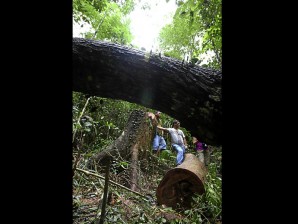
Bicol and Catanduanes are running out of forest cover due to untramelled illegal cutting of trees. CDN FILE PHOTO
LEGAZPI CITY—The two Bicol provinces of Catanduanes and Camarines Norte were categorized as “hot spots” by the recently formed Regional Anti-illegal Logging Task Force (RAILTF) to protect them against illegal logging, a ranking regional environment official said here on Tuesday.
Joselin Marcus Fragada, DENR Bicol executive director and RAILTF chair, said the two provinces were tagged hot spots after reports were received on the widespread illegal cutting of trees there.
He warned illegal logging syndicates operating in Bicol that “their time is running out as the campaign against their illegal activities would be relentlessly pursued by the task force.”
He declined to name the syndicates as surveillance operations are ongoing against them.
In a press briefing on Tuesday, Fragada said Bicol has a total of 543,000 hectares of forest land, out of which only 155,689 hectares have remained as forested areas that could be found in Catanduanes and Camarines Norte.
He said Camarines Norte has 86,931 hectares of forest cover, while Catanduanes has 68,758 hectares of forest land.
The RAILTF was put to test on Tuesday as policemen and personnel of the Navy seized 70 pieces of round logs and 60 pieces of narra flitches in Barangay Inascan, a remote village on the slopes of Mt. Mayon in Guinobatan, Albay.
Navy Lt. Darwin Nieva said the team was conducting an anti-illegal logging operation when they were tipped off by residents that trees were being cut in the area.
He said a Christopher Magnaye, village chief of the barangay, and his companion, were unable to show documents to support their claims that the logs and flitches were legal.
The seized pieces of lumber were turned over to the Provincial Environment and Natural Resources Office in Albay.
On Tuesday, the DENR passed a resolution creating the RAILTF which is tasked to move against illegal loggers, and pursue cases against them.
Fragada said the RAILTF was created in compliance with Executive Order No. 23 which imposes an indefinite total ban on logging, and calls for the creation of illegal logging task forces in various provinces.
Under the EO, the DENR would be restricted from issuing logging permits and contracts “in all natural and residual forests.” This includes the renewal of tree-cutting permits in all forests all over the country.
The task force is authorized to act on reports of illegal logging from local executives through their governors, or regional directors of the Department of Interior and Local Government.